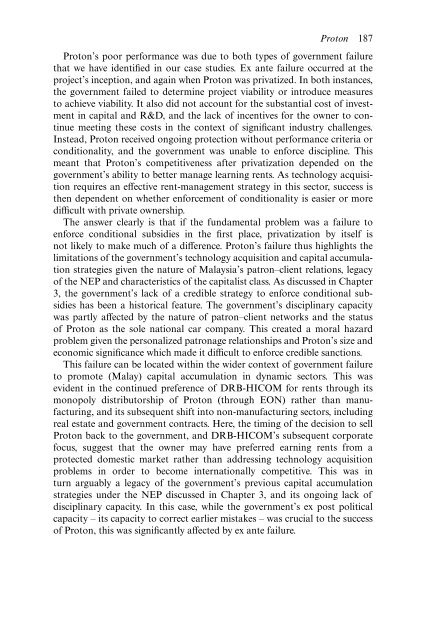PRIVATIZATION Privatization in Malaysia, Regulation, rent-seeking and policy failure
PRIVATIZATION Privatization in Malaysia, Regulation, rent-seeking and policy failure
PRIVATIZATION Privatization in Malaysia, Regulation, rent-seeking and policy failure
You also want an ePaper? Increase the reach of your titles
YUMPU automatically turns print PDFs into web optimized ePapers that Google loves.
Proton 187Proton’s poor performance was due to both types of government <strong>failure</strong>that we have identified <strong>in</strong> our case studies. Ex ante <strong>failure</strong> occurred at theproject’s <strong>in</strong>ception, <strong>and</strong> aga<strong>in</strong> when Proton was privatized. In both <strong>in</strong>stances,the government failed to determ<strong>in</strong>e project viability or <strong>in</strong>troduce measuresto achieve viability. It also did not account for the substantial cost of <strong>in</strong>vestment<strong>in</strong> capital <strong>and</strong> R&D, <strong>and</strong> the lack of <strong>in</strong>centives for the owner to cont<strong>in</strong>uemeet<strong>in</strong>g these costs <strong>in</strong> the context of significant <strong>in</strong>dustry challenges.Instead, Proton received ongo<strong>in</strong>g protection without performance criteria orconditionality, <strong>and</strong> the government was unable to enforce discipl<strong>in</strong>e. Thismeant that Proton’s competitiveness after privatization depended on thegovernment’s ability to better manage learn<strong>in</strong>g <strong>rent</strong>s. As technology acquisitionrequires an effective <strong>rent</strong>-management strategy <strong>in</strong> this sector, success isthen dependent on whether enforcement of conditionality is easier or moredifficult with private ownership.The answer clearly is that if the fundamental problem was a <strong>failure</strong> toenforce conditional subsidies <strong>in</strong> the first place, privatization by itself isnot likely to make much of a difference. Proton’s <strong>failure</strong> thus highlights thelimitations of the government’s technology acquisition <strong>and</strong> capital accumulationstrategies given the nature of <strong>Malaysia</strong>’s patron–client relations, legacyof the NEP <strong>and</strong> characteristics of the capitalist class. As discussed <strong>in</strong> Chapter3, the government’s lack of a credible strategy to enforce conditional subsidieshas been a historical feature. The government’s discipl<strong>in</strong>ary capacitywas partly affected by the nature of patron–client networks <strong>and</strong> the statusof Proton as the sole national car company. This created a moral hazardproblem given the personalized patronage relationships <strong>and</strong> Proton’s size <strong>and</strong>economic significance which made it difficult to enforce credible sanctions.This <strong>failure</strong> can be located with<strong>in</strong> the wider context of government <strong>failure</strong>to promote (Malay) capital accumulation <strong>in</strong> dynamic sectors. This wasevident <strong>in</strong> the cont<strong>in</strong>ued preference of DRB-HICOM for <strong>rent</strong>s through itsmonopoly distributorship of Proton (through EON) rather than manufactur<strong>in</strong>g,<strong>and</strong> its subsequent shift <strong>in</strong>to non-manufactur<strong>in</strong>g sectors, <strong>in</strong>clud<strong>in</strong>greal estate <strong>and</strong> government contracts. Here, the tim<strong>in</strong>g of the decision to sellProton back to the government, <strong>and</strong> DRB-HICOM’s subsequent corporatefocus, suggest that the owner may have preferred earn<strong>in</strong>g <strong>rent</strong>s from aprotected domestic market rather than address<strong>in</strong>g technology acquisitionproblems <strong>in</strong> order to become <strong>in</strong>ternationally competitive. This was <strong>in</strong>turn arguably a legacy of the government’s previous capital accumulationstrategies under the NEP discussed <strong>in</strong> Chapter 3, <strong>and</strong> its ongo<strong>in</strong>g lack ofdiscipl<strong>in</strong>ary capacity. In this case, while the government’s ex post politicalcapacity – its capacity to correct earlier mistakes – was crucial to the successof Proton, this was significantly affected by ex ante <strong>failure</strong>.


